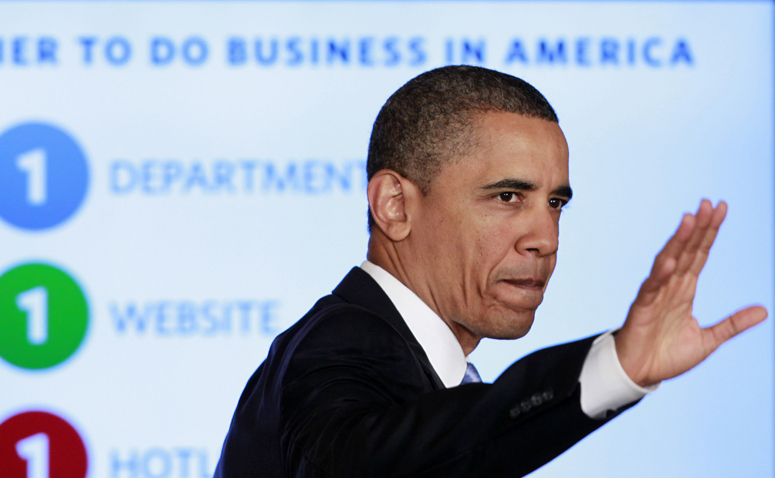WASHINGTON — President Barack Obama today took aim at his government’s own messy bureaucracy, prodding Congress to give him greater power to merge agencies and promising he would start by collapsing six major economic departments into one. Pressing Republicans on one of their own political issues, Obama said it was time for an “effective, lean government.”
Obama wants the type of reorganizational authority last held by a president when Ronald Reagan was in office. Obama’s version would be a so-called consolidation authority allowing him to propose only mergers that promise to save money and shrink government. The deal would help Obama considerably by entitling him to an up-or-down vote from Congress in 90 days.
Still, final say would remain with lawmakers, both on whether to grant Obama this fast-track authority and then in deciding whether to approve any of his specific ideas.
“We can do this better,” Obama declared in an event with business owners at the White House, even presenting slides to help make his case.
“So much of the argument out there all the time is up at 40,000 feet, these abstract arguments about who’s conservative or who’s liberal,” Obama said. “Most Americans — and certainly most small business owners — you guys are just trying to figure out how do we make things work, how do we apply common sense. And that’s what this is about.”
In an election year and a political atmosphere of tighter spending, Obama’s move is about more than improving a giant bureaucracy. He is attempting to directly counter Republican arguments that he has presided over the kind of government regulation, spending and debt that can undermine the economy — a dominant theme of the emerging presidential campaign.
Republicans have often aligned themselves with smaller government. So politically, Obama is trying to put the onus on Republicans in the House and Senate to show why they would be against the pursuit of leaner government.
From Capitol Hill, a spokesman for Sen. Mitch McConnell of Kentucky, the top Republican in the Senate, pledged Obama’s plan would get a careful review.
But the spokesman, Don Stewart, also said: “After presiding over one of the largest expansions of government in history, and a year after raising the issue in his last State of the Union, it’s interesting to see the president finally acknowledge that Washington is out of control.”
Obama has an imperative to deliver. He made the promise to come up with a smart reorganization of the government in his last State of the Union speech last January.
At the time, Obama grabbed attention by pointing out the absurdity of government inefficiency. In what he called his favorite example, Obama said: “The Interior Department is in charge of salmon while they’re in fresh water, but the Commerce Department handles them when they’re in saltwater. And I hear it gets even more complicated once they’re smoked.”
The White House said the problem is serious for consumers who turn to their government for help and often do not know where to begin.
Not in decades has the government undergone a sustained reorganization of itself. Presidents have tried from time to time, but each part of the bureaucracy has its own defenders inside and outside the government, which can make merger ideas politically impossible. That’s particularly true because “efficiency” is often another way of saying people will lose their jobs.
Obama hopes to enhance his chances by getting Congress to give him the assurance of a clean, relatively speedy vote on any of his proposals.
There is no clear sign that Obama would get that cooperation. He spent much of 2011 in utter gridlock with Republicans in Congress.
In the meantime, Obama announced today that Karen Mills, the administrator of the Small Business Administration, would be elevated to Cabinet-level rank. But her job would essentially disappear if Obama has his way.
If he gets the new fast-track power to propose legislation, Obama’s first project would be to combine six major operations of the government that focus on business and trade.
They are: the Commerce Department’s core business and trade functions; the Small Business Administration; the Office of the U.S. Trade Representative; the Export-Import Bank; the Overseas Private Investment Corporation; and the Trade and Development Agency. The goal would be one agency designed to help businesses thrive.
The White House says 1,000 to 2,000 jobs would be cut, but the administration would do so through attrition; that is, as people routinely leave their jobs over time.
The administration said the merger would save $3 billion over 10 years by getting rid of duplicative overhead costs, human resources divisions and programs.
The name and potential secretary of the new agency have not been determined.
The point, the White House says, is not just making the government smaller but better by saving people time and eliminating bureaucratic nightmares. The idea for the consolidated business agency grew out of discussions with hundreds of business leaders and agency heads over the last several months.
Brendan Buck, a spokesman for House Speaker John Boehner, R-Ohio, said streamlining government was always a potentially good idea but expressed wariness about whether Obama’s plan would really help business.
“American small businesses are more concerned about this administration’s policies than from which building in Washington they originate,” Buck said. “We hope the president isn’t simply proposing new packaging for the same burdensome approach.”
According to the White House, presidents held such a reorganizational authority for about 50 years until it ran out during Reagan’s presidency in 1984.
Obama has a series of other ideas about consolidating departments across the government, to be rolled out later.
Send questions/comments to the editors.



Comments are no longer available on this story